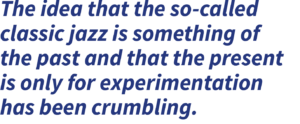
Jazz, criticism, communication and social media
Jazz since its birth, being as it was a form of musical expression of the African-American community, was initially ignored, even hidden, by the general white-dominated society. However, thanks to its own cultural significance, its rich musical content and the vast expressive force it offered, that initial public perception changed and jazz gradually started to break through and infiltrate the daily life of the majority of the social strata.
Thus, around the thirties of the last century, it began to be talked about in the press, it appeared in more specialized magazines and the first books were published talking about that new music called jazz. The truth is that many journalists, critics, musicologists and other so-called “specialists” of the time did so out of ignorance or from racist, supremacist or ideological prejudices. Few were those who approached the subject from a respectful position, having made the effort to study this music, accepting the fact that it belongs to another culture and that it responds to different parameters from those of Western music.
 Unfortunately, over the years, things have not improved much. Apart from the aforementioned prejudices, there is the avant-garde wave that since the end of the Second World War has imposed itself in all fields of art, often acting as a kind of dictatorship that intends to control where the paths of art and its future evolutions should go (abstraction, conceptualism, rupturism, etc.). It has also affected the development of jazz music and the public’s perception of this genre.
Unfortunately, over the years, things have not improved much. Apart from the aforementioned prejudices, there is the avant-garde wave that since the end of the Second World War has imposed itself in all fields of art, often acting as a kind of dictatorship that intends to control where the paths of art and its future evolutions should go (abstraction, conceptualism, rupturism, etc.). It has also affected the development of jazz music and the public’s perception of this genre.
In this way, what once was a popular music of wide acceptance since the sixties, has now become a niche music. Young people who intend to practice jazz in schools and conservatories receive biased information aimed at promoting avant-garde trends that often move away from the contents that give jazz its specific character.
But suddenly, in the last twenty years, the phenomenon of social media has arisen, through which, for better or worse, people express themselves openly, freeing themselves from the impositions of the official world that dominates the traditional communication channels (press, radio, television).
Thanks to this phenomenon, we realize that everything that the past critics would have wanted us to believe is far from the truth. In the field of jazz, specifically, the idea that the so-called classic jazz is something of the past and that the present is only for experimentation has been crumbling.
If we take a look at Youtube we will find many very young performers from all over the world who play the most traditional varieties of jazz in a confident and spirited way. And we will also notice the broad number of old records that are uploaded and the great variety of enthusiastic comments that they generate.
It’s a symptom!